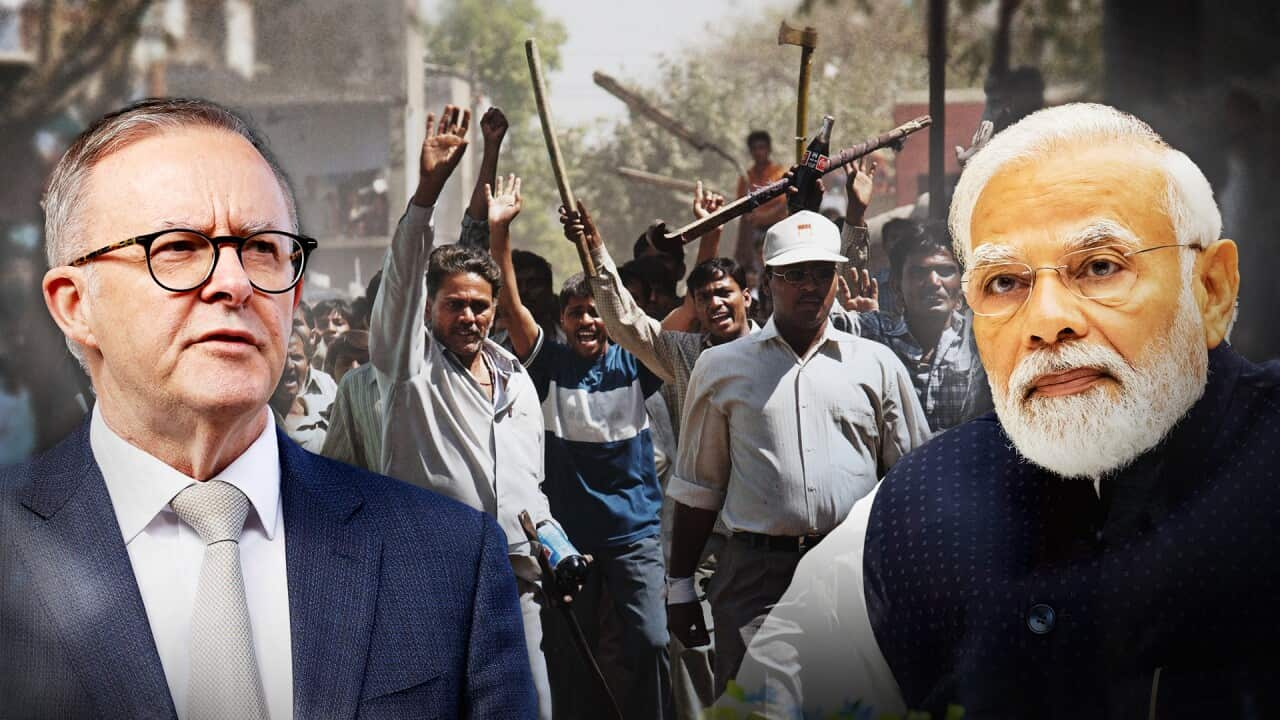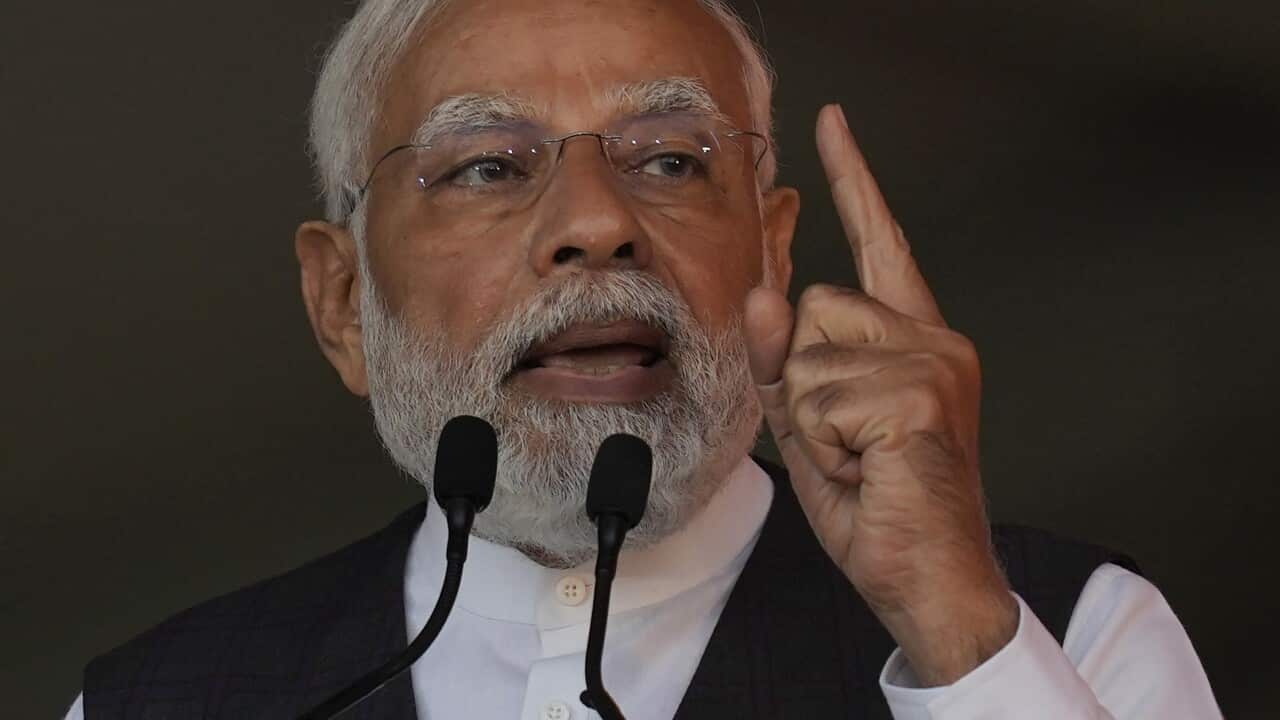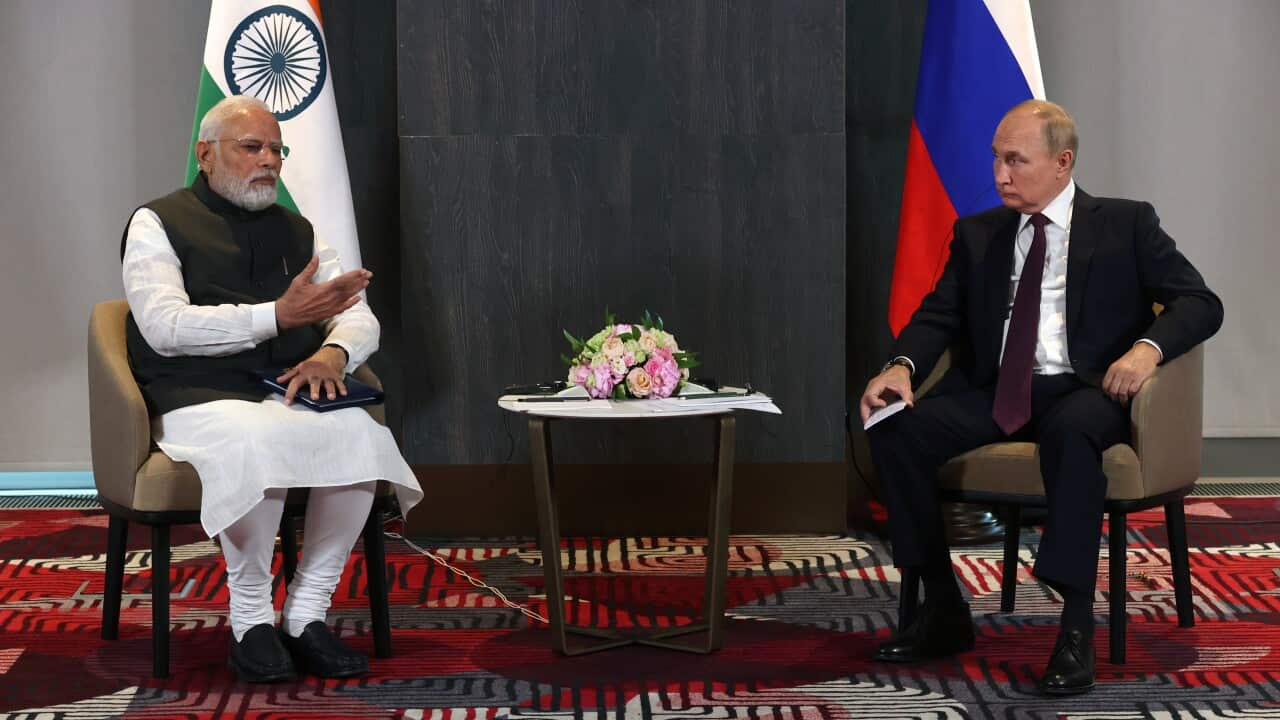Key Points
- Prime Minister Anthony Albanese will travel to India this week.
- Indian leader Narendra Modi has faced allegations of allowing abuses against Muslims, which he denies.
- Official figures state 1,044 people - the majority Muslim but more than 250 Hindus - were murdered by mobs in the 2002 riots.
Content warning: this article contains references to violence including sexual assault.
For decades, Ahmed (not his real name) has carried a photo album of what happened in Gujarat.
Charred bodies, some of them children. Others show signs of violent attacks.
The images, seen by SBS News but too graphic to publish, were taken in the immediate aftermath of the 2002 riots in Gujarat, a state hugging India's western coastline.
Official figures state 1,044 people - the majority Muslim but more than 250 Hindus - were murdered by mobs in a .

Narendra Modi, then chief minister of Gujarat, heading to riot-affected areas in Ahmedabad Gujarat India on 28 February 2002. Credit: Dipam Bhachech / Getty Images
And as many attacks focused on Gujarat’s Muslim population in the ensuing crisis, Ahmed’s father pulled his wife aside. A family member had been killed.
“[He told her] if the area is compromised, and we've been attacked by mobs … then they should consume poison,” Ahmed, now living in Australia, says.
“Do that with my sisters, so they don't get sexually tortured. Because by that point, we would be dead.”
'One word: fear'
Prime Minister Anthony Albanese is in India to meet his counterpart Narendra Modi, who was Gujarat's chief minister at the time.
Travelling alongside 25 Australian business leaders, Mr Albanese is eager to deepen ties with a country projected to have the world's biggest population by the end of this year. and the last Census showed India has overtaken China when it comes to overall migration to Australia.
While trade will be a key focus for Mr Albanese, claims of human rights abuses, particularly in relation to India's Muslim population, loom large.
Mr Modi, now India’s fourth-longest serving prime minister, was alleged to have turned a blind eye to the 2002 riots in Gujarat, according to a senior police officer's statement in India's Supreme Court.
Mr Modi has always vehemently rejected the claims, and .
But despite the ruling, human rights groups and political experts argue Hindu nationalism has become more entrenched since his government took power in 2014.

The documentary was met with a swift rebuke by Mr Modi's Bharatiya Janata Party (BJP), which used emergency powers to ban the first episode - focusing on Gujarat - from airing in India.
"The bias, lack of objectivity and continuing colonial mindset are blatantly visible," a government spokesperson said.
Soon after, BBC offices in New Delhi and Mumbai were raided by authorities, as part of what they insisted was a tax investigation. Documents and phones belonging to journalists were .
Based on his experience at the time, Ahmed strongly believes Mr Modi and the BJP were complicit in the Gujarat violence.
“My memories of India, if I was to summarise them in one word: fear,” he says.
Valuable strategic partner
In August, during the Gujarat riots.
Human Rights Watch (HRW) South Asia director Meenakshi Ganguly said many in the international community viewed India as a "valuable strategic" partner given, unlike China, it is a democracy.

Official figures say 1,044 people, mostly Muslims, were killed during the Gujarat riots in 2002. Source: AFP / STR / AFP via Getty Images
HRW reports have also warned attacks and mob violence against religious minorities have been on the rise since the BJP swept to power, including communal violence in Delhi which killed 53 people, 40 of them Muslim, in 2020.
HRW said the minorities targeted include Muslims, but also other groups - including Sikhs and Christians - and that nationalist groups were empowered by the justice system.
That Delhi violence erupted after months of protests against controversial citizenship laws implemented by Mr Modi's government, which . Mr Modi denied that accusation.
Ms Ganguly said the BJP and its affiliates had “long promoted a Hindu majoritarian nationalist ideology”, with members and supporters having been indicted for hate speech, incitement to violence, and even violence itself.
"The BJP government has failed to properly investigate and prosecute its supporters for these crimes. On the other hand, authorities have filed politically motivated charges, and even jailed, critics," she said.
Extrajudicial killings are also being carried out against people trading cows, viewed by Hindus as sacred, HRW warns. In February, two Muslims were allegedly killed and burned in Haryana state, police arresting a suspect .
'Moral colonies of Western journalism'
Mr Modi's office did not respond to requests for comment from SBS News.
But soon after taking power, he publicly rejected religious provocation from "the minority or the majority".
"I strongly condemn such violence. My government will act strongly in this regard," he pledged.
Jay Shah, president of the Overseas Friends of BJP Australia - which does not speak on behalf of the party or Indian government - rejected claims that violence against religious minorities is on the rise in India.

Mr Modi (second from right) and India will host the G20 Leaders' Summit this year. Source: AFP / SAUL Loeb / AFP via Getty Images
Mr Shah said India, under Mr Modi, had “taken care of all its citizens” during the COVID-19 crisis, and he was yet to “come across even a single case of discrimination in this mammoth endeavour”.
“Its 1.4 billion population is united and confident that India will not become moral colonies of Western journalism or the West or anyone else,” he said.
“Its democratic institutions are stronger and at par or, in some cases above, many other peers and are able to tackle its own issues without external interventions.”
Mr Shah said what the two leaders discuss is their own "prerogative", but hoped issues like deepening trade, climate change, collaboration over technology, and "of course cricket" will be on the agenda.
'Diplomatic minefields'
Robin Jeffrey, an expert in Indian politics at La Trobe University, accepted the India-Australia relationship included “a lot of little diplomatic minefields” to be walked through.
Mr Jeffrey said the this week was the result of “careful behind-the-scenes diplomatic work” with New Delhi.
The BJP has a substantial amount of popular support and will form government in three states, including two with a Christian majority, after elections this month.

Many were angered by the early release of men convicted of rape and murder during the Gujarat riots. Source: AFP / Sajjad Hussain / AFP via Getty Images
But he said that in his view, an undercurrent of the BJP was an “ultimate goal” to create a “very homogenised India, of a particular Hindu kind”.
“[It’s] to create a single version, which would also endorse Hindu supremacism. It would be a majoritarian kind of government, using this ultimate religious appeal,” he said.
Mr Jeffrey warned the sidelining of religious minorities, including around 200 million Muslims living in India, was likely to create further tension.
“It's hard to imagine being able to kick sand in the face of a large proportion of your population for a very long time without some reaction coming. It’s not going to be very nice,” he said.

Communal violence erupted in Delhi in 2020 over controversial citizenship laws which human rights groups said excluded Muslims. Credit: Sanchit Khanna / Hindustan Times via Getty Images
“That was very much the language around the Godhra [train burning before the Gujarat riots]: it’s time to put them in their place. Everyone knew who ‘them’ was,” he said.
'He has learned that lesson'
Australian Strategic Policy Institute analyst Teesta Prakash believed Mr Modi had changed since 2002, realising outbreaks of violence “cannot become a large-scale event” as India’s place on the world stage grows.
“To be a good leader in India, you cannot let that sort of stuff fly, essentially. You have to be a secular leader, and he has learned that lesson,” she said.
“You need to make sure that these events remain under control, because you're just under that much of an international media glare.”
While the Hindu faith is central to the BJP, Mr Modi projects a modern form of Hinduism in a “very strategic way”, Dr Prakash said.
Preparations for the G20, which India will host this year, are plastered with a Sanskrit saying: “The world is one family”.

Mr Modi had a strong relationship with former prime minister Scott Morrison. Credit: PMO Australia
His broad appeal is derived from a combination of policies aimed at easing household pressures - like gas and oil subsidies - and a focus on “security-oriented protection”, she said.
“[Then] there’s his demeanour, being inscrutable. He's not a corrupt leader … If I could sum it up in one word, it’s essentially charisma,” she said.
'Behind closed doors'
Foreign Minister Penny Wong's language shifted during her own trip to New Delhi last week.
On Wednesday, , which she stressed had settled the matter. She did not address the BBC raid directly, saying Canberra "engages" with New Delhi on human rights issues.
By Thursday evening, after repeated questions from journalists, .
"We advocate in relation to these matters publicly and privately, and I think yesterday I declined to do so through the media," she said.

Foreign Minister Penny Wong's language shifted in India this week. Source: AAP / LUKAS COCH/AAPIMAGE
In her view, Australian politicians publicly criticising the Indian government would be counterproductive, and undermine a relationship that had taken “so much effort on both sides” to improve.
“A lot of diplomacy that Australia does is behind closed doors and through interpersonal relationships,” she said.
"India keeps Australia on the same page as well ... It's a two-way street with everything, values and interests."
Dr Prakash accepted polarisation is on the rise in India, with certain religions and caste groups “being favoured over another”, something Mr Modi was neither publicly supporting or “coming out and denying”.
“There’s a passive silence on his behalf,” she said.
And as the Indian diaspora in Australia grows, Dr Prakash said Canberra will increasingly view religious polarisation in India as a problem.
Ahmed's message to Anthony Albanese
On Tuesday, the day before his departure, Mr Albanese praised a “rich friendship underpinned by shared democratic values”, saying he looked forward to welcoming Mr Modi when he travels to Australia this year.
His comments were endorsed by Coalition leader Peter Dutton, who said: “The warmth that [Mr Modi] has for our country is sincere”.
Thousands of kilometres from India, Ahmed says he feels "completely hopeless" as he watches his country descend into what he describes as an "extreme state".
“They're hardly held to account by the Indian government, and the Indian government is hardly held to account by foreign governments ... If you're Muslim, you just live in fear. You hide yourself,” he said.
He is clear on what he wants from Mr Albanese.
“Ask [Mr Modi] to hold the Hindu extremist groups, who continue to murder innocent Muslims, to account,” he said.
“Even if [Mr Modi's] not going to take responsibility for what happened in Gujarat, at least stop the whole of India turning into a living nightmare.”



